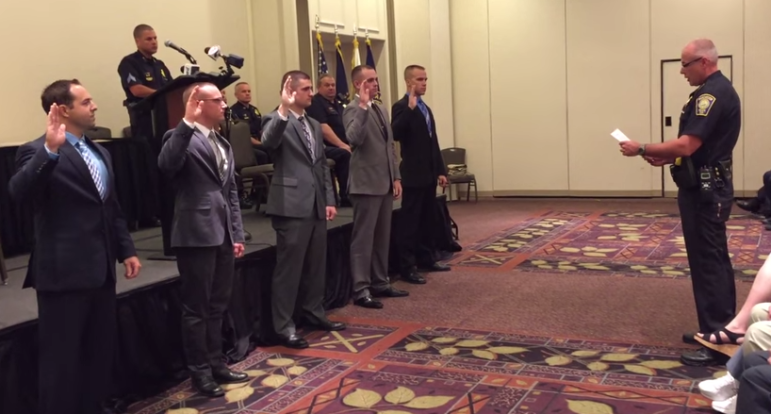
MANCHESTER, NH – Manchester Police Chief Nick Willard has some holes to fill in his roster. Annual retirements are looming and there are 21 open jobs, so keeping tabs on overtime to pick up the slack while preparing for the next round of recruitment tests is a big focus in the balance between budget constraints and public safety.
Hiring is crucial.
He has plans to push for an immediate increase in the number of new hires – over and above the current 21 open positions. At a time when the volume of calls for service is exploding, and the quest for qualified candidates to join the force is ever more frustrating, it’s the only way to get ahead of the game.
“I will ask to go to 26 officers. It’s never been done in the past, but I’m confident I will get support from City Hall,” says Willard.
The bigger challenge will be finding qualified recruits.
A good cop is harder to find these days, and it’s not a problem unique to Manchester, or even New Hampshire. Within the past decade, the issue has moved front and center in the national conversation over what has been described as a “public sector crisis,” with an estimated 80 percent of law enforcement agencies around the country, large and small, with police officer positions they can’t fill.
Preparing for Next Test Nov. 21
In preparing for the next round of Manchester Police Officer entrance exams (application deadline is Nov. 12), Assistant Chief Carlo Capano is hoping for the best – but based on the two most recent test results, it’s unlikely the department will find enough qualified recruits to fill the 21 openings, he says.
Currently, there are about 170 applications. They’d like to get 250, although realistically, that would be a stretch.
“I can say that in the past five, ten – even fifteen years – we used to have far more sign up to take the test. It was a much more competitive process to get into the force,” says Capano. “What’s behind that? Well, what we’re seeing is a lot of potential hires looking at the retirement system and the changes being made, or considering where they can make more money as a police officer someplace other than Manchester,” he says. “We used to give police tests and get 500 people show up for 10 or 15 open slots. I haven’t had that many in – well, I can’t tell you the last time we did.”
But the biggest hurdle in the hiring process is the number of those who, for one reason or another, can’t make it to the testing finish line.
Many Will Apply, Few Will be Sworn In
As seen in the charts below, only about 3.7 percent of those who signed up for the most recent police exams passed all the required hurdles to become Manchester Police officers. For example, of the 158 who signed up for the March 2015 test, only five were hired.
And the percentage of hires from last November’s test was only slightly better, says Capano, with 6 of the 140 people who signed up to take the test making it to the swearing-in ceremony.


Combining the numbers from the past year, the overall breakdown follows:
- 73 percent of the total 298 people who initially signed up for the last two entrance exams actually showed up to take the test.
- 35 percent of those who took the written exam failed (includes math, reading comprehension and retention, writing and grammar.)
- Of the 140 remaining candidates, 34 percent failed the physical exam (includes push-ups, sit-ups, bench press, 1.5 mile timed run and a trigger pull to gauge hand strength.)
- Of the 92 remaining candidates, 25 percent failed the oral board interviews.
- And of the final pool of 67 potential officers, 11 made it through the one-on-one and polygraph testing to be hired in the past year.
Many fall by the wayside due to the background packet, a battery of 1o0 questions distributed to those who make it through the written and physical exams.
“They have seven days to return it, and it includes detailed and specific information about their personal experience with everything from motor vehicle incidents or accidents, tickets, or arrests, to contact with police, drug and alcohol use – what we’re trying to do is get a good picture of who this person is,” says Capano.
The number of those who are immediately eliminated based on their answers alone – use of marijuana within the past 12 months, or a narcotic drug within the past three years – is on the rise, says Capano. Those benchmarks are designed to take into consideration youthful mistakes or experimentation while distancing them from any active drug use or criminal activity.
If they aren’t honest in answering the test packet questions, it’s usually discovered during the polygraph test, says Capano.
“Many get to the point where they look good on paper, but then they come in for the one-to-one background interview with a background investigator. It’s a two to three-hour process during which our investigator will find discrepancies between what they said in their packet and what they are telling them,” says Capano. “It can be a little frustrating, but we’re not going to lower our standards,”
Capano and others within the department are constantly looking at their recruitment techniques and outreach tactics, as are police departments across the country.
Recruiting with Future Vision in Mind
In a 2012 survey of police brass by the U.S. Department of Justice and the Office of Community Oriented Policing Services, agencies were asked to share their vision of policing 10 years in the future. Better, smarter recruitment was the pivot point.
The vision law enforcement agencies had for the future of policing by the year 2022 included words like collaboration, analysis, and leadership, plus, the elimination of public fear of law enforcement agencies, and making strides in safety and community policing through confidence building rather than by increasing arrests.
Capano says that, under Chief Willard, the Manchester Police Department will continue to seek out the best and most qualified candidates, period.
Getting up to full complement, for Manchester, means sticking to the current rigorous testing requirements while looking for ways to shape the future Manchester Police Department to reflect this unique community while meeting the rigors of a 21st-century full service law enforcement agency.
As career paths go, it’s becoming a tough sell – especially to millennials, who are more statistically attracted these days to high-tech and private sector occupations. However, to its advantage, Manchester Police Department already has a proven track record for leading edge technology in police work, with the recent national accolades for its predictive analytics program.
Capano says he will continue to map out long-term recruitment goals to find potential officers wherever they may be, using social media and outreach strategies directed at millennials. But they will also consider that the next generation of “peace officers” could be home grown through continued programs including Police Explorers and MPAL outreaches, and community initiatives in schools, from elementary age all the way up through colleges and universities, in New Hampshire and beyond.
“We want the best qualified young candidates, period, and we will continue our outreach, through social media, newspapers, websites. Of course, we’ll keep targeting veterans and those looking for second careers also – but we’re hitting every possible market to find the best of the best,” says Capano.
- Click here to review the NH Police Standard & Training Council testing requirements.
- Click here to sign up for the next Manchester NH Police Exam (deadline Nov. 12).
 You’re one click away! Sign up for our free eNewsletter and never miss another thing.
You’re one click away! Sign up for our free eNewsletter and never miss another thing.







